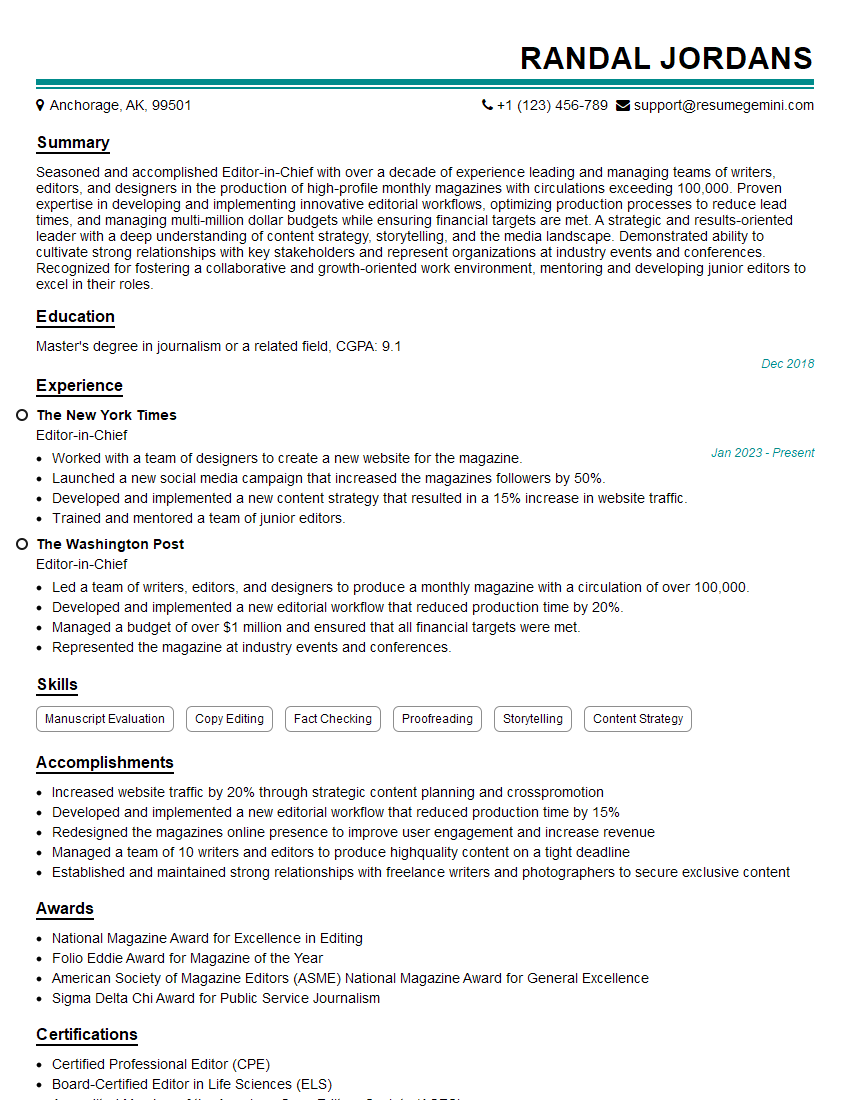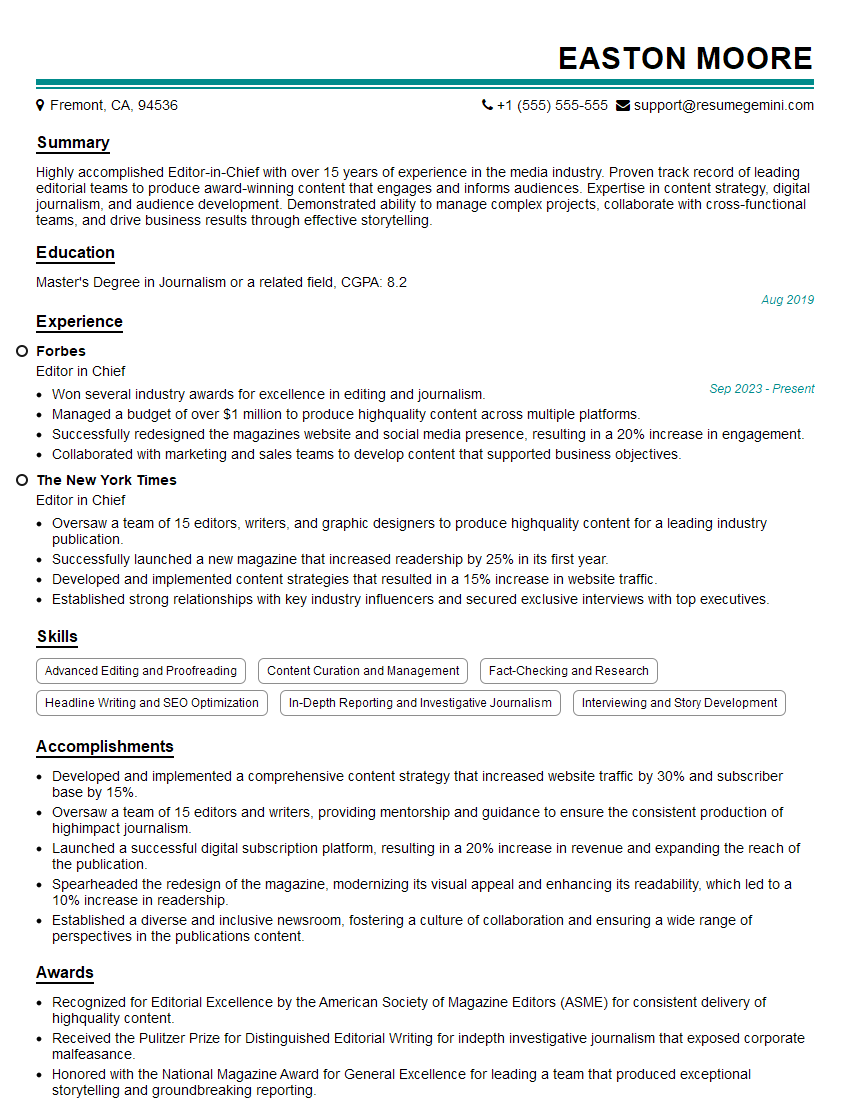Are you gearing up for an interview for a Editor-in-Chief position? Whether you’re a seasoned professional or just stepping into the role, understanding what’s expected can make all the difference. In this blog, we dive deep into the essential interview questions for Editor-in-Chief and break down the key responsibilities of the role. By exploring these insights, you’ll gain a clearer picture of what employers are looking for and how you can stand out. Read on to equip yourself with the knowledge and confidence needed to ace your next interview and land your dream job!
Acing the interview is crucial, but landing one requires a compelling resume that gets you noticed. Crafting a professional document that highlights your skills and experience is the first step toward interview success. ResumeGemini can help you build a standout resume that gets you called in for that dream job.
Essential Interview Questions For Editor-in-Chief
1. How do you stay abreast of the latest trends in journalism and publishing?
- Network with industry professionals and attend conferences.
- Read industry publications and blogs.
- Follow thought leaders on social media.
- Experiment with new technologies and platforms.
- Take online courses and workshops.
2. What are your thoughts on the future of journalism?
subheading of the answer
- The future of journalism is bright.
- The need for reliable and accurate news and information will always exist.
- Journalism will continue to evolve as new technologies and platforms emerge.
- Journalists will need to adapt to the changing landscape.
- The future of journalism is in our hands.
subheading of the answer
- The future of journalism is uncertain.
- The decline of print media and the rise of digital media have created challenges for the industry.
- Journalists are facing increasing pressure to produce content quickly and cheaply.
- The future of journalism depends on the ability of the industry to adapt to the changing landscape.
- Journalism is more important than ever in today’s world.
3. What are the most important qualities of a successful Editor-in-Chief?
- Strong leadership skills.
- Excellent communication skills.
- A deep understanding of journalism and publishing.
- A commitment to ethical standards.
- A vision for the future of the publication.
4. What are your strengths and weaknesses as an Editor-in-Chief?
- Strengths:
- Strong leadership skills.
- Excellent communication skills.
- A deep understanding of journalism and publishing.
- A commitment to ethical standards.
- A vision for the future of the publication.
- Weaknesses:
- I can be too demanding at times.
- I am not always good at delegating.
- I can be too focused on the details.
- I am not always good at taking criticism.
- I can be too hard on myself.
5. What is your experience with managing a team of editors and writers?
- I have over 10 years of experience managing a team of editors and writers.
- In my previous role, I was responsible for leading a team of 10 editors and writers.
- I have a proven track record of success in managing teams and developing high-quality content.
- I am confident in my ability to lead and motivate a team of editors and writers to produce outstanding work.
- I am also experienced in working with freelance writers and editors.
6. What is your experience with developing and implementing editorial strategies?
- I have over 10 years of experience developing and implementing editorial strategies.
- In my previous role, I was responsible for developing and implementing the editorial strategy for a leading magazine.
- I have a proven track record of success in developing and implementing editorial strategies that increase readership and engagement.
- I am confident in my ability to develop and implement an editorial strategy that will help your publication achieve its goals.
- I am also experienced in working with marketing and sales teams to develop and implement integrated marketing campaigns.
7. What is your experience with using social media to promote content?
- I have over 10 years of experience using social media to promote content.
- In my previous role, I was responsible for managing the social media accounts for a leading magazine.
- I have a proven track record of success in using social media to increase readership and engagement.
- I am confident in my ability to use social media to promote your content and reach your target audience.
- I am also experienced in using social media to build relationships with influencers and partners.
8. What is your experience with using data to inform editorial decisions?
- I have over 10 years of experience using data to inform editorial decisions.
- In my previous role, I was responsible for using data to track the performance of our content.
- I have a proven track record of success in using data to make informed editorial decisions that increase readership and engagement.
- I am confident in my ability to use data to inform your editorial decisions and help you achieve your goals.
- I am also experienced in using a variety of data analytics tools.
9. What is your experience with working with a diverse team of editors and writers?
- I have over 10 years of experience working with a diverse team of editors and writers.
- In my previous role, I managed a team of editors and writers from a variety of backgrounds.
- I have a proven track record of success in creating a positive and inclusive work environment.
- I am confident in my ability to work with a diverse team of editors and writers to produce high-quality content.
- I am also experienced in working with people from different cultures and perspectives.
10. What is your experience with working under pressure?
- I have over 10 years of experience working under pressure.
- In my previous role, I was responsible for managing a team of editors and writers and meeting tight deadlines.
- I have a proven track record of success in delivering high-quality content on time and under pressure.
- I am confident in my ability to work under pressure and meet your deadlines.
- I am also experienced in working in a fast-paced environment.
Interviewers often ask about specific skills and experiences. With ResumeGemini‘s customizable templates, you can tailor your resume to showcase the skills most relevant to the position, making a powerful first impression. Also check out Resume Template specially tailored for Editor-in-Chief.
Career Expert Tips:
- Ace those interviews! Prepare effectively by reviewing the Top 50 Most Common Interview Questions on ResumeGemini.
- Navigate your job search with confidence! Explore a wide range of Career Tips on ResumeGemini. Learn about common challenges and recommendations to overcome them.
- Craft the perfect resume! Master the Art of Resume Writing with ResumeGemini’s guide. Showcase your unique qualifications and achievements effectively.
- Great Savings With New Year Deals and Discounts! In 2025, boost your job search and build your dream resume with ResumeGemini’s ATS optimized templates.
Researching the company and tailoring your answers is essential. Once you have a clear understanding of the Editor-in-Chief‘s requirements, you can use ResumeGemini to adjust your resume to perfectly match the job description.
Key Job Responsibilities
An Editor-in-Chief is the most senior position within an editorial department. The role is responsible for overseeing all aspects of the editorial process, from selecting and editing content to managing staff and ensuring that the publication meets its objectives.
1. Content Management
The Editor-in-Chief is responsible for selecting and editing the content that is published in the publication. This includes writing, editing, and fact-checking articles, as well as commissioning work from freelance writers.
- Developing and implementing a content strategy that aligns with the publication’s goals and objectives.
- Identifying and acquiring high-quality content that meets the publication’s standards.
2. Editorial Leadership
The Editor-in-Chief is responsible for providing leadership to the editorial staff. This includes setting the editorial vision for the publication, managing the editorial budget, and providing feedback and guidance to staff.
- Providing leadership and mentorship to the editorial team, fostering a collaborative and productive work environment.
- Establishing and maintaining editorial policies and procedures to ensure consistency and quality.
3. Business Management
The Editor-in-Chief is responsible for the business management of the editorial department. This includes managing the editorial budget, negotiating contracts with freelance writers, and representing the publication at industry events.
- Managing the editorial budget and resources effectively to ensure financial viability.
- Negotiating contracts and managing relationships with freelance writers, photographers, and other contributors.
4. Strategic Planning
The Editor-in-Chief is responsible for strategic planning for the editorial department. This includes identifying trends in the industry, developing new editorial initiatives, and ensuring that the publication remains relevant to its audience.
- Conducting market research and analysis to identify industry trends and audience preferences.
- Developing and implementing strategic plans to enhance the publication’s reach, impact, and revenue.
Interview Preparation Tips
Preparing for an Editor-in-Chief interview requires a combination of research, practice, and self-reflection. Here are some tips to help you ace the interview:
1. Research the Publication
Before the interview, take some time to research the publication and its audience. This will help you understand the publication’s mission, style, and target audience. You should also familiarize yourself with the publication’s recent content and any upcoming projects.
- Visit the publication’s website and social media pages.
- Read recent articles and reviews of the publication.
- Attend industry events where you can meet the publication’s staff.
2. Prepare Your Portfolio
Your portfolio is one of the most important things you can bring to an Editor-in-Chief interview. It should showcase your best work and demonstrate your skills as an editor. Include a variety of samples, such as articles, blog posts, and other writing samples.
- Select your best work that demonstrates your range of skills and experience.
- Organize your portfolio in a logical and easy-to-navigate way.
- Be prepared to talk about your portfolio in detail.
3. Practice Your Answers
Take some time to practice answering common interview questions. This will help you feel more confident and prepared during the interview. Some common questions you may be asked include:
- Tell me about your experience as an editor.
- What are your strengths and weaknesses as an editor?
- What is your vision for the publication?
- How do you stay up-to-date on industry trends?
4. Dress Professionally
First impressions matter, so dress professionally for your interview. This means wearing a suit or business casual attire. Make sure your clothes are clean, pressed, and fit well.
5. Be Yourself
It’s important to be yourself during the interview. The interviewer wants to get to know the real you, so don’t try to be someone you’re not. Be genuine, enthusiastic, and passionate about your work.
Next Step:
Now that you’re armed with interview-winning answers and a deeper understanding of the Editor-in-Chief role, it’s time to take action! Does your resume accurately reflect your skills and experience for this position? If not, head over to ResumeGemini. Here, you’ll find all the tools and tips to craft a resume that gets noticed. Don’t let a weak resume hold you back from landing your dream job. Polish your resume, hit the “Build Your Resume” button, and watch your career take off! Remember, preparation is key, and ResumeGemini is your partner in interview success.

